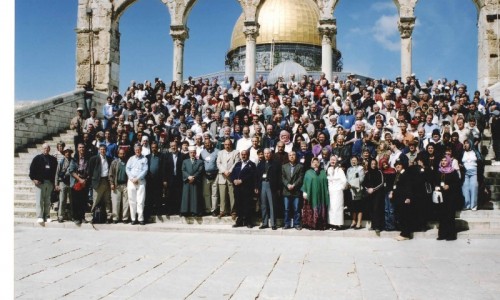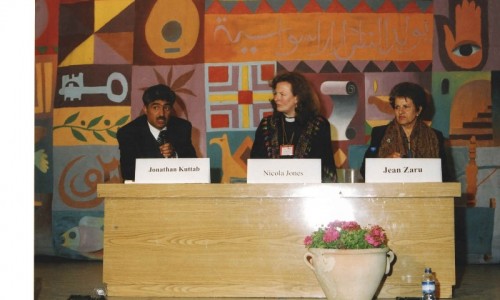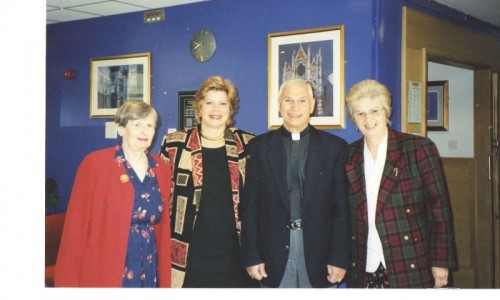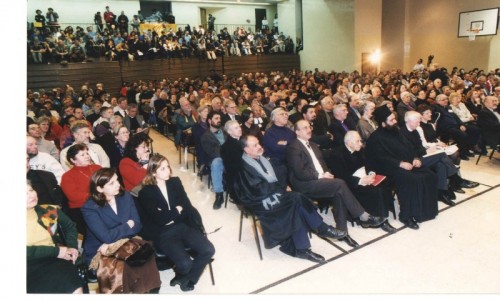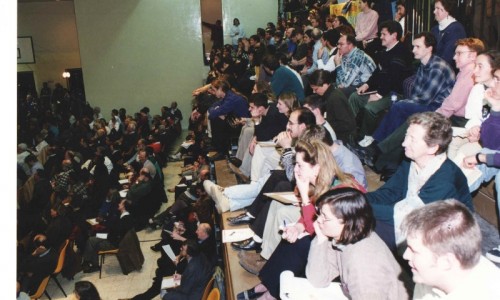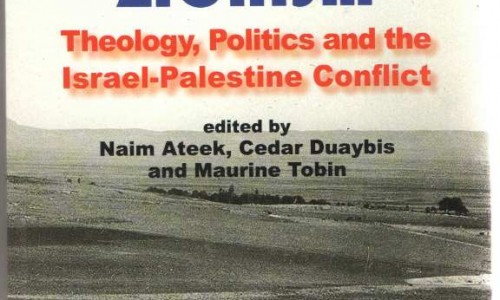April 2004
CHALLENGING CHRISTIAN ZIONISM
In April 2004, Sabeel held its 5th international conference on the theme of Challenging Christian Zionism. Over 500 people representing more than 30 countries attended the conference at the Notre Dame Center in Jerusalem.
Sabeel’s conference on Christian Zionism had been brewing for a number of years. Many of us were aware of the dangers of the teachings and beliefs of millions of western Christians around the world but we did not feel that enough scholarly research had been done to warrant a conference. By 2004, it was clear that a number of people, mostly evangelicals, had done important groundbreaking research to merit a public exposure of this “heresy.”
But what are we talking about? Who are the Christian Zionists and what is Christian Zionism? Simply put, this is a term used to identify any Christian who, due to a particular understanding and interpretation of the Bible, supports the in gathering of all Jews to Israel and their claim to the whole land of Palestine and, therefore, denies Palestinian rights. In other words, such a person is a Christian who espouses the Zionist ideology, turns it into a theology and works diligently for its implementation.
The term Christian Zionism has arisen relatively recently. In fact, in its origin this concept had nothing to do with political Zionism. Surprisingly, such Christian religious thinking preceded the rise of Zionism at the end of the 19th century. Most people wrongly assume that the rise of Christian Zionism took place in the aftermath of the establishment of the state of Israel in 1948. They believe that as a result of anti-semitism and the holocaust, millions of western Christians identified with the Israeli state and the Jewish people. Such a view is not borne by historical research. Christian Zionism, before it became known by this name, started as a religious phenomenon among certain Protestant and Evangelical circles, first in Britain and then in the United States, long before Jewish political Zionism came into existence. It was bred and nourished by a serious but literal reading of the Bible. In its inception, it had nothing to do with what Jews were thinking or doing. Sincere Evangelical Christians, on their own, were searching their Bibles for signs of the end of the world. They saw the pervasiveness of evil everywhere around them and they felt that nothing short of Christ’s Return would remedy the infectious and malignant spread of sin and evil. They believed that the Bible contained all truth not only about the past but also about the present and the future. They only needed to apply themselves to serious and intelligent study, “wisely interpreting the word of truth.” Since they believed that the Bible is inerrant in all of its parts, they felt free to pick and choose verses from various parts of the Bible and link them together in a way that produced a scheme and a chart for the End of Days. These Christians were fundamentalist in their approach to the Bible and in their endeavors to discover God’s plan for history. Earlier schemes were continuously revised and refined or overhauled by new exegetes. Indeed, the Bible was used as a jigsaw puzzle with different pieces plucked from here and there, sometimes out of context, and placed together in order to give a composite picture of God’s purpose for the End. Consequently, a road map for the Second Coming was fashioned with a number of variations depending on the person or the organization that produced it.
The central enigma revolved around one question: When will the Second Coming of Christ take place? Although Christ warned against any speculation regarding his return and the end of the world, these Biblical literalists were convinced that the Bible contained important clues that could help them discern the signs of the times. The Second Coming of Christ became the goal and the objective of their quest. One of the most important resources in this quest was the biblical prophetic material, and the central players were the Jewish people.
Since so much of the prophetic material in the Bible was written at a time in which Jews were living in exile, i.e. outside the land of Palestine, Evangelical Christians, began to use these prophecies that predicted their return, not as having been fulfilled in their historical context several centuries before Christ under Persian rule, but as prophecies about to be fulfilled in their own times or in the near future. This was the central point of departure. Everything else hinged on it. They believed that in order to know the purposes of God in history, one needs to watch what is happening to the Jewish people. They are God’s key players. They occupy center stage in the scenario of the End. They concluded that Christ cannot physically return to earth unless the Jewish people are living in the land. Passages like Ezekiel 37 became foundational texts for the return of the Jewish people to the land. Such passages were conveniently taken out of their historical context and transposed to the 19th and 20th centuries. Around them, elaborate systems of belief were contrived and kept changing with the passage of time. Every time political and historical events rendered some aspects of their scheme untenable, modifications and revisions were readily introduced.
The real boost for Christian Zionism came in the second part of the 20th century after the establishment of the state of Israel in 1948. The immigration of hundreds of thousands of Jews from many countries of the world into Israel was, for most Evangelicals, the fulfillment of biblical prophecy and the first step towards the End of history. The real confirmation, however, came with the conquest by Israel of the West Bank, including East Jerusalem, in 1967. For these Christians, this was the beginning of the end. The Second Coming of Christ was believed to be near and Armageddon lay in sight. They were anxiously waiting for Jews in Israel to demolish the Muslim Dome of the Rock in order to build the third temple and thereby usher in the scenarios of the End.
Although some of the lectures in this book will make clear in greater detail the history, theology, and politics of Christian Zionism, I would like to lay down very briefly the reasons that led Sabeel to hold its conference in 2004.
1. As I have already indicated, one of the practical reasons for holding the conference then was the important research that had been already done in this field. Many of us were keenly aware of the biblical and theological problems and dangers inherent in Christian Zionism. We could detect the growing impact of this “Christian heresy” among many sincere yet misguided and misinformed western Christians but lacked sufficient research to address the issue. Once a body of research had been developed, the conference could include a number of Evangelicals who had researched and published in this field. Since the conference, more resources have been produced, including this book, in order to help people understand more thoroughly the latent dangers of this phenomenon.
2. To the chagrin of many of us Christians, the dangers of Christian Zionism have not been taken seriously by the mainline churches all over the world. To my knowledge, none of the major theological schools and denominational seminaries has been teaching any courses about it. It has been perceived largely as the view of fundamentalist groups of Christians who are simplistic in their biblical interpretation and theologically naïve and unsophisticated. They have been seen as fringe groups who reject the scholarly approach to the Bible and cling to literal interpretation, thus missing the essence of the biblical message. Then one day we woke up to discover that these supposedly fringe groups number millions of Christians and are spreading rapidly in various parts of the world. Therefore, there is a great need to help people understand who Christian Zionists are, what they believe, and how they impact the question of war and peace, especially in the Middle East today.
3. Many of us assumed that Christian Zionism exists in fundamentalist and Evangelical churches only. Upon closer observation, we discovered that in reality Christian Zionism has permeated Christians within mainline churches as well as among Catholics and the Orthodox in various levels and forms. It is an unconscious and superficial response to any Bible reading by people who have not had the benefit of theological education or have not studied the Bible carefully and so accept things uncritically simply because they are written in the Bible. This means that our problem is not only with extremist evangelicals; it is with many good hearted but ignorant Christians who need to be informed and educated.
4. Before the 1967 war, secular Zionism was the dominant and influential expression of Jewish political Zionism in Israel. After the war a gradual shift took place from secular to religious political Zionism. By 1977, the right wing coalition of political parties called Likud came to power with Menahem Begin as Prime Minister. Begin was able to forge closer links between the right wing government of Israel and the Christian Right in the United States. Most of the Christians who belong to these groups are considered Christian Zionists. This collusion between Jews and the Christian religious right served the two sides. Although Israel did not believe in their religious scenarios of the End, the close bond brought advantages to Israel. Christian Zionists provided important financial, political, and moral support to Israel. In fact, they were perceived as the best friends Israel had. They gave blind and uncritical support to Israel. They did not question Israel’s unjust policies towards the Palestinians. From their faith perspective, they believed that, in order to be faithful to God, they must stand with Israel at all times.
5. It is important to differentiate between Jewish and Christian Zionism in this regard. Whether we agree or disagree with it, the goal of Jewish Zionism has been to bring Jews from their diaspora into Israel so that they might find a safe haven and live in security and peace. Yet frankly speaking, the goal of Christian Zionism, according to their scenario of the End, is to bring the Jewish people to Israel in order to be annihilated or converted to the Christian Faith. They believe that this would fulfill God’s purposes in history and usher in the Second Coming of Christ. The relationship between Jewish and Christian Zionists, therefore, reflects a tragic hypocrisy. Each is using the other for its own purposes. Perceived in this light, Christian Zionism is the worst anti-semitism one can imagine.
6. For a number of years, it has been clear that Christian Zionists are close to people of power in Washington D.C. Because they represent a sizable voting power, they wield great influence. When one combines their influence with that of the neo-conservatives and the pro-Israel lobby, AIPAC, their impact becomes formidable. In the political arena, they have been influencing American foreign policy in the Middle East, not for a just peace that takes into consideration the rights and well being of both peoples – Israelis and Palestinians – but for whatever is in Israel’s favor. In other words, they have sought to guarantee the continuation of Israel’s domination and oppression of the Palestinian people.
7. Throughout the last 2000 years, the Christian Church has faced many theological heresies and controversies. Some of them were more damaging than others. Yet, the church survived with vitality and vigor. In the case of Christian Zionism we are not up against an academic theological debate that goes on within theological schools or among scholars and bears no consequences on people’s lives. We are confronted with certain false teachings based on the Bible that are a matter of life or death to fellow Christians in another part of the world. Christians living thousands of miles away engage in theological and biblical conjectures that affect the destiny of millions of people in the Middle East. This is being done in the name of God, not to better their lives but to lead millions of them to destruction.
8. As will become clearer in this book, Christian Zionism continues to promote a violent theology of the End of history. They base this on selected passages from the Bible that are not in line with the authentic message and spirit of the Scriptures. Indeed, there are many passages in the Bible that describe war. But the biblical message is about peace, not war. Although there is much violence in some of the biblical writings, God’s message for the world is about love, peace, and forgiveness and not about violence and terrorism. A theology of Armageddon with its emphasis on a violent end of the world and the massacre of millions of people does not harmonize with God’s nature as revealed to us in Christ. It is, therefore, a false and untenable Christian theology of God that denies God’s love for the world. That is why many Christians who oppose the theological fallacy of Christian Zionism insist that Christian theology of the End must conform to an authentic theology of God in Christ. Any theology that promotes the massacre of millions of people cannot be of God. We must again emphasize the fact that it is a very dangerous theology because it does not take seriously God’s love shown to us in the suffering, death, and resurrection of Christ.
9. The conference aimed at affirming a more authentic theology that lifts up the banner of justice and peace, a theology that calls people to act for truth and justice and to work for peace and reconciliation, a theology that resists Empire and the forces of domination and calls people to a life of peace and service. Indeed, there is a great threat facing the people of Israel-Palestine. It is not, however, the threat of Palestinian terrorism. It is the threat that has its roots in the Israeli military occupation and oppression of over three million Palestinians. God cannot be pleased when the forces of Empire deny God’s children their basic God-given rights to life and freedom. Faithfulness to God forces us to act on behalf of our fellow human beings who are oppressed and dehumanized.
The book contains a number of papers that directly or indirectly relate to the topic of Christian Zionism. It is meant to inform and educate people. It is meant to help readers challenge their Christian Zionist neighbors with the truth and facts of what is happening in Palestine and how the Bible is being used as an instrument of oppression rather than as an instrument of liberation. This book is meant to challenge clergy to take the time to study the phenomenon of Christian Zionism and to address it through their preaching and teaching. It is also meant to challenge us all to double our endeavors in seeking and working for a just peace in Israel-Palestine.
God is not the God of Armageddon but the God of Golgotha. This is the God who continues to call us to a loving service of our fellow human beings. Ultimately, it is only by the grace of God and the toil of dedicated people throughout the world that we can address not only the heretical teachings of Christian Zionism but all the evils and myths that are preventing us from a just peace in Israel-Palestine where Palestinians and Israelis can live as neighbors in peace and security and share the land under God. We call on all people of faith to pray and work for the achievement of this goal.
Naim Ateek
Sabeel, Jerusalem
June 2005

